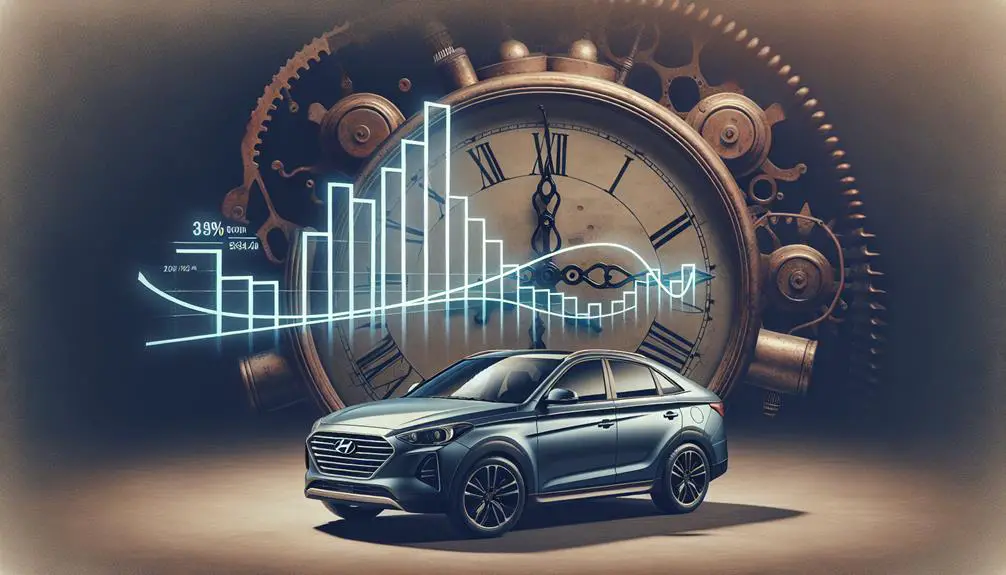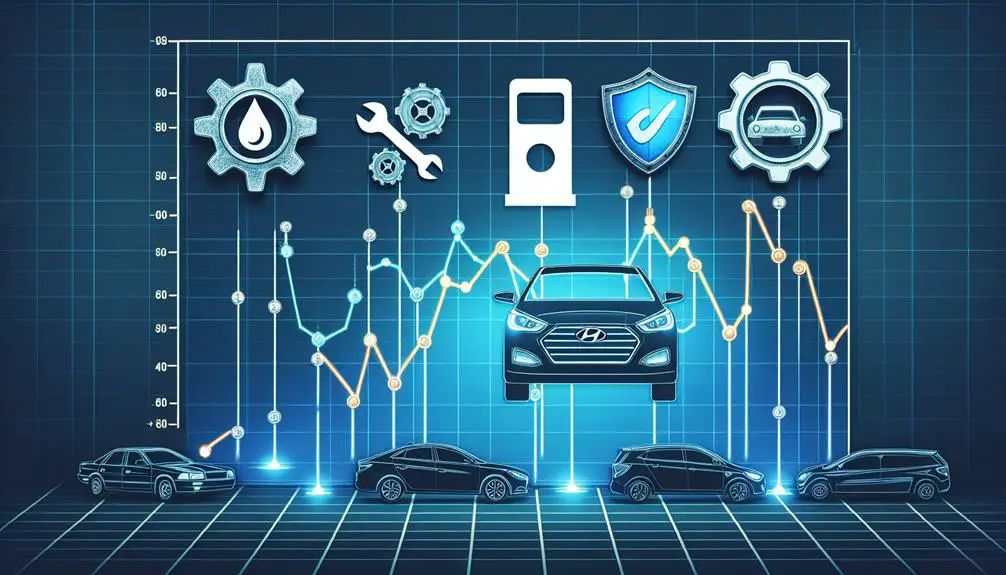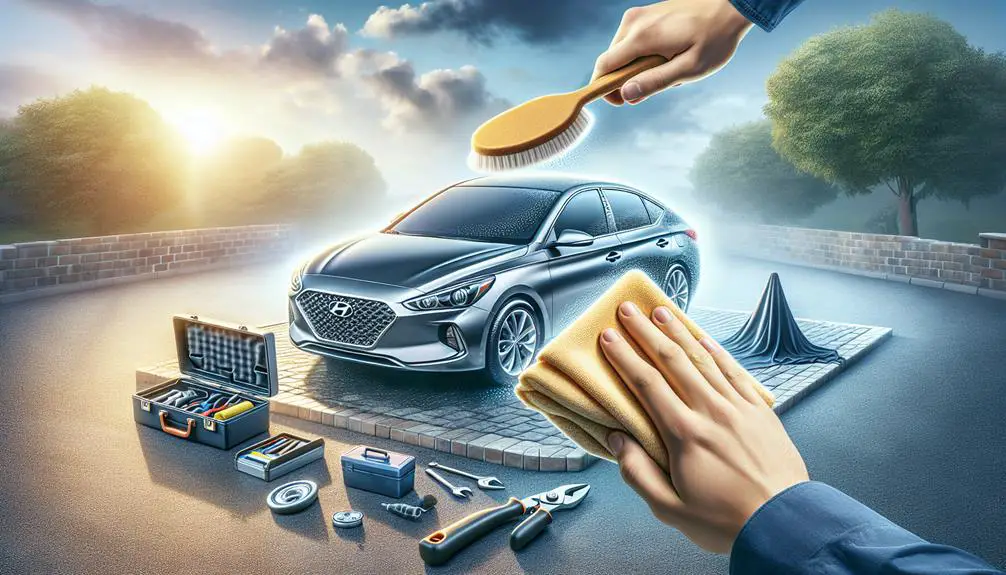Hyundai vehicles generally have a moderate resale value, which varies significantly across different models and is influenced by various factors.
You've likely heard debates on how well vehicles retain their worth, and Hyundai's position in this panorama is particularly poignant. Comparing brands on value retention reveals a mosaic of factors influencing Hyundai's resale allure.
From depreciation rates to model-specific performances, grasping what affects a Hyundai's value could guide your next car purchase decisively.
As we delve into the intricacies of maintaining a Hyundai's value, you'll unearth tips and trends that could decisively sway your decision-making process. Stay with us to uncover which models top the charts and why.
Hyundai's Depreciation Rate

Hyundai vehicles typically devalue about 40% within the initial five years, making it vital for potential buyers to take into account this factor when evaluating their investment. This depreciation rate is influenced by a multitude of factors including market trends and ownership costs.
You'll find that market trends play a significant role in Hyundai's resale value. As consumer preferences shift towards SUVs and eco-friendly vehicles, models outside these categories may see a steeper decline in value. Moreover, technological advancements and updates in newer models can make older versions seem outdated, accelerating their depreciation.
Ownership costs, encompassing maintenance, insurance, and fuel efficiency, have a direct impact on Hyundai's depreciation rate. Models known for their reliability and lower cost of ownership tend to retain their value better. Conversely, vehicles that require expensive upkeep or are less fuel-efficient may depreciate more quickly.
Analyzing these aspects provides a clearer picture of why Hyundai vehicles depreciate at the rate they do. It's essential to weigh these factors carefully when considering a Hyundai purchase, as they directly affect the long-term value of your investment.
Comparing Brands on Value Retention
When evaluating the long-term value of a vehicle, it's vital to compare how different brands hold up regarding value retention, ensuring you're making a well-informed choice. Delving into competitive analysis and scrutinizing market trends are essential steps in comprehending not just Hyundai's standing but also how it stacks against its rivals.
| Brand | Average Value Retention after 5 Years (%) |
|---|---|
| Hyundai | 60% |
| Toyota | 65% |
| Ford | 55% |
| Chevrolet | 50% |
This table illustrates a snapshot of how Hyundai competes in the realm of value retention. Toyota leads the pack, with Hyundai not far behind, showcasing its resilience in holding its value over time. Ford and Chevrolet, while still strong contenders, lag slightly in terms of value retention after five years.
These figures are a vital to Hyundai's commitment to quality and reliability, factors that influence resale value to a great extent. However, it's also a reminder of the dynamic nature of market trends, where no brand remains unchallenged. By analyzing this competitive landscape, you're equipped with insight into which brand might offer you the best value over the long haul, factoring in depreciation and market demand.
Factors Affecting Hyundai's Resale Value

Grasping the factors that impact Hyundai's resale value is key to making an informed purchasing decision. Initially, market trends play a pivotal role. As consumer preferences shift towards SUVs and eco-friendly vehicles, models that fall into these categories often see a lesser depreciation compared to sedans or older, less fuel-efficient vehicles. It's crucial you keep an eye on these trends since they can greatly influence the resale value of your Hyundai.
Another critical factor is Hyundai's warranty coverage, renowned for being one of the most generous in the automotive industry. This warranty not only gives you peace of mind but also enhances the vehicle's resale value. Potential buyers are more inclined to contemplate a pre-owned Hyundai knowing that it's still under warranty. This aspect can set Hyundai apart in the used car market, making its models more appealing and potentially retaining more value over time.
Comprehending these factors helps you gauge how well a Hyundai will hold its value. By contemplating market trends and the advantage of Hyundai's warranty coverage, you're better equipped to make a choice that guarantees a higher resale value down the line.
Top Performing Hyundai Models
Delving into the lineup, several Hyundai models stand out for their exceptional resale value, reflecting their market desirability and technological advancements. It's not just about the looks; it's the Hyundai innovations and safety features that set these vehicles apart. Let's analyze the top performers that excel in retaining their value.
| Model | Key Innovations | Notable Safety Features |
|---|---|---|
| Hyundai Tucson | SmartSense technology, hybrid options | Lane Keeping Assist, Forward Collision-Avoidance Assist |
| Hyundai Santa Fe | Hybrid and plug-in hybrid versions | Safe Exit Assist, Blind-Spot Collision-Avoidance Assist |
| Hyundai Palisade | Premium infotainment system | Ultrasonic Rear Occupant Alert, Highway Driving Assist |
| Hyundai Kona | Electric variant with impressive range | Rear Cross-Traffic Collision Warning, Lane Following Assist |
| Hyundai Elantra | Wireless connectivity, eco-friendly models | Driver Attention Warning, High Beam Assist |
These models not only showcase the best of Hyundai's technical prowess but also come equipped with advanced safety features, ensuring they remain highly sought after in the resale market. The combination of innovative technology and prioritization of safety solidifies their position as top performers in retaining value.
Tips for Maintaining Hyundai's Value

Appreciating the factors that contribute to the high resale value of Hyundai models, let's investigate practical tips to maintain or even enhance this value over time. A Hyundai, with its reliable performance and advanced features, can continue to offer exceptional value, provided you adhere to certain strategies.
- Utilize Warranty Coverage: Hyundai's industry-leading warranty isn't just a proof of the vehicle's reliability; it's a value-retention tool. Make sure you're familiar with the warranty specifics and stay within its terms. Keeping your car under warranty can significantly impact its market value, reassuring potential buyers of its maintained condition.
- Follow Regular Maintenance: Routine checks and services are non-negotiable. Regular maintenance prevents minor issues from becoming major, expensive problems, thereby preserving the car's value.
- Practice Seasonal Maintenance: Adjust your car care with the changing seasons. Whether it's winterizing your vehicle or preparing it for the summer heat, seasonal maintenance ensures your Hyundai adapts well to different conditions, preventing weather-related wear and tear.
- Maintain Detailed Records: Document every service, repair, and even routine maintenance. A well-documented history is compelling evidence of a well-maintained vehicle, significantly enhancing its resale value.
Conclusion
In summary, you've seen how Hyundai's depreciation rate is competitively low, making it a smart choice compared to other brands. Factors like warranty, reliability, and fuel efficiency play vital roles in bolstering its resale value.
Specifically, models like the Santa Fe and Tucson stand out for retaining value. To optimize your Hyundai's value, adhere to maintenance schedules and keep it in good condition.
Thoroughly analyzing these aspects, it's evident Hyundai offers a compelling value retention proposition for savvy car buyers.